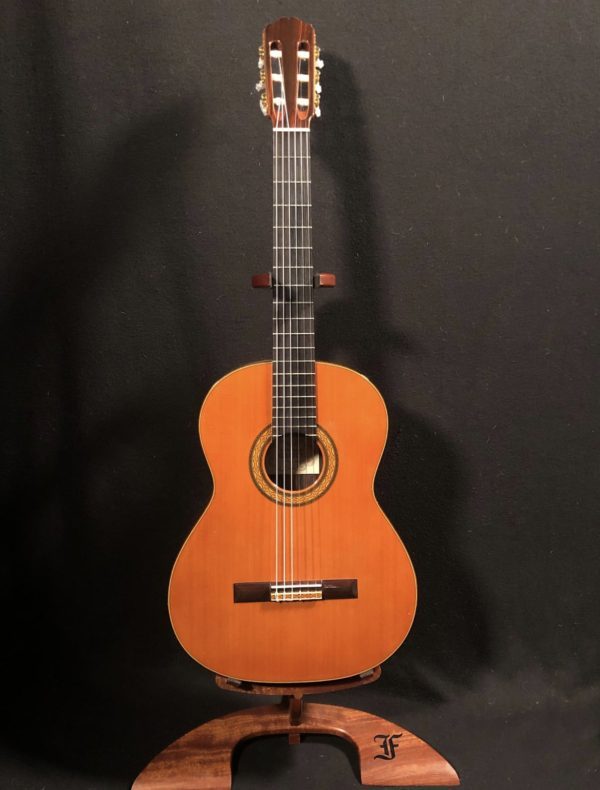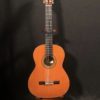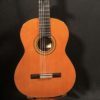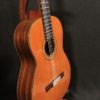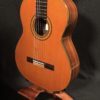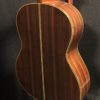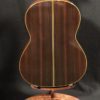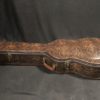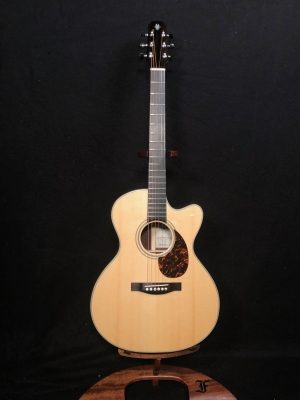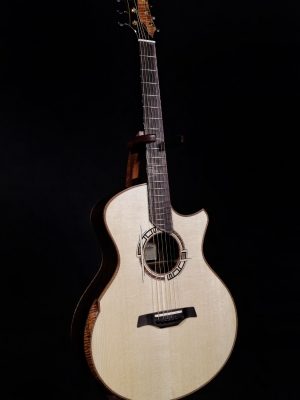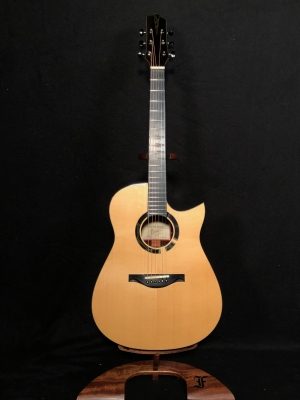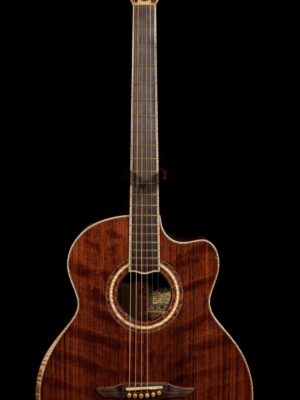Description
1974 Aranjuez – Kohno Mumber 7 Classical Latin Rosewood/Cedar
Aranjuez-Kohno classical guitar is very balanced with rich complex overtones, relatively low action, and is extremely playable. Really an amazing vintage classical guitar!
This Aranjuez No7 guitar was finished in 1974 at Masaru Kohno workshop. It was top of the line model of that era. Its body was made by Takamine Gakki, its soundboard and final assembly done either by Masaru Kohno himself or one of his apprentices. This is an amazing-sounding classical guitar and plays great!
Aranjuez guitars line was founded by Juan Orozco and MasaruKohno in early 1970s with a designation mostly for the Japanese market. They were initially made by the Takamine workshop under Kohno’s supervision. From the early 1980s through the mid2010s they were made by the Matsuoka workshop. Now they are made again by Takamine.
Since the origin of this brand, the very top models were assembled and finished at Kohno’s workshop. The bodies of those top models were made by Takamine or Matsuoka workshops, while soundboards made by Masaru Kohnohimself and in later years by Masaki Sakurai.
The secret of Aranjuez guitars is that they have always offered exceptional value to the player on a budget. Top Aranjuez models sound better than many other guitars sold by leading Japanese makers at 2 times higher prices. Currently, the very top Aranjuez model 725 (still being assembled and finished by Masaki Sakurai) is priced 250 000 yen. It sounds better than many other guitars sold in Japan for 500 000 yen.
This Aranjuez No7 guitar was priced 70 000 yen while yearly starting salary of a Japanese college graduates was around 75 000 yen. It however sounds much better than Kohno No10 from the same year (priced 100 000 yen). Only Kohno No15 (priced 150 000 yen) could be considered as equal grade instrument. I am sure that many players would favor this Aranjuez No7 over any Kohno model.
What is also very important to mention is that while all Aranjuez models of that era had Cedar tops, all Kohno models had Spruce tops. Regardless of what some sellers believe and claim in their listings, Masaru Kohno wasn’t making Cedar top guitars until 1985. Those Cedar top models were made in very limited numbers (perhaps by special order only), their soundboards look very dark, rosettes and bridge decoration is different from those used on regular Spruce top models. In some sense, this Aranjuez No7 guitar can be considered as Kohno 15 with Cedar top.
This guitar offers exceptional volume and response combined with very romantic tonality. Its trebles are super sweet, round, yet very crisp. Basses are deep and full of overtones, yet relatively clean. All notes are well balanced, note clarity and separation fantastic, sustain amazing.
I am sure that every experienced player will agree that this guitar beats many “hand made in Spain” $15000+ guitars available on US market. This guitar remains in overall excellent condition. Besides few ultra-light marks on its body this guitar looks and smells like new.
Specifications:
This Aranjuez-Kohno classical guitar is very balanced with rich complex overtones, relatively low action, and is extremely playable. Really an amazing vintage classical guitar!
This Aranjuez No7 guitar was finished in 1974 at Masaru Kohno workshop. It was top of the line model of that era. Its body was made by Takamine Gakki, its soundboard and final assembly done either by Masaru Kohno himself or one of his apprentices. This is an amazing-sounding classical guitar and plays great!
Aranjuez guitars line was founded by Juan Orozco and MasaruKohno in early 1970s with a designation mostly for the Japanese market. They were initially made by the Takamine workshop under Kohno’s supervision. From the early 1980s through the mid2010s they were made by the Matsuoka workshop. Now they are made again by Takamine.
Since the origin of this brand, the very top models were assembled and finished at Kohno’s workshop. The bodies of those top models were made by Takamine or Matsuoka workshops, while soundboards made by Masaru Kohnohimself and in later years by Masaki Sakurai.
The secret of Aranjuez guitars is that they have always offered exceptional value to the player on a budget. Top Aranjuez models sound better than many other guitars sold by leading Japanese makers at 2 times higher prices. Currently, the very top Aranjuez model 725 (still being assembled and finished by Masaki Sakurai) is priced 250 000 yen. It sounds better than many other guitars sold in Japan for 500 000 yen.
This Aranjuez No7 guitar was priced 70 000 yen while yearly starting salary of a Japanese college graduates was around 75 000 yen. It however sounds much better than Kohno No10 from the same year (priced 100 000 yen). Only Kohno No15 (priced 150 000 yen) could be considered as equal grade instrument. I am sure that many players would favor this Aranjuez No7 over any Kohno model.
What is also very important to mention is that while all Aranjuez models of that era had Cedar tops, all Kohno models had Spruce tops. Regardless of what some sellers believe and claim in their listings, Masaru Kohno wasn’t making Cedar top guitars until 1985. Those Cedar top models were made in very limited numbers (perhaps by special order only), their soundboards look very dark, rosettes and bridge decoration is different from those used on regular Spruce top models. In some sense, this Aranjuez No7 guitar can be considered as Kohno 15 with Cedar top.
This guitar offers exceptional volume and response combined with very romantic tonality. Its trebles are super sweet, round, yet very crisp. Basses are deep and full of overtones, yet relatively clean. All notes are well balanced, note clarity and separation fantastic, sustain amazing.
I am sure that every experienced player will agree that this guitar beats many “hand made in Spain” $15000+ guitars available on US market. This guitar remains in overall excellent condition. Besides few ultra-light marks on its body this guitar looks and smells like new.
Specifications:
Top: High GradeSolid Cedar/cashew lacquer
Back and Sides: Solid Latin America Rosewood /cashew lacquer
Neck: Mahogany
Fingerboard: Ebony
Tuning Machines: high-grade gold plated
Scale: 660 mm
Nut Width: 52 mm
Nut & Saddle:Bone
The current action is set to 3.30 mm under E6 and 2.80 under E1 with plenty of extra room on the saddle. It will be shipped in a lightly used luxurious archtop hardshell case.
The current action is set to 3.30 mm under E6 and 2.80 under E1 with plenty of extra room on the saddle. It will be shipped in a lightly used luxurious archtop hardshell case.

